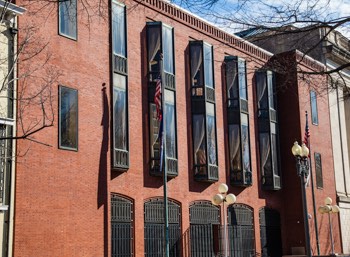 Husky Injection Molding Systems Ltd. v. Athena Automation Ltd., 2015-1726, 2015-1727, 2016 U.S. App. LEXIS 17373 (Fed. Cir. Sept. 23, 2016) (Before Lourie, Plager, and Stoll, J.) (Opinion for the Court, Lourie, J.)
Husky Injection Molding Systems Ltd. v. Athena Automation Ltd., 2015-1726, 2015-1727, 2016 U.S. App. LEXIS 17373 (Fed. Cir. Sept. 23, 2016) (Before Lourie, Plager, and Stoll, J.) (Opinion for the Court, Lourie, J.)
Husky’s ‘536 patent was directed to a molding machine having a clamp assembly. Schad, former owner and President of Husky and co-inventor of the ‘536 patent, assigned the patent to Husky in 2007. Schad later sold Husky to a private equity group and left to form Athena. Athena filed a petition for inter partes review in 2012, challenging the patentability of all 22 claims of the ‘536 patent. Husky filed a preliminary response arguing only that assignor estoppel barred Athena from filing a petition for review. The Board instituted review of claims 1, 4-16, 18, and 20-22 and found them to be anticipated by Arend. Claims 2, 3, 17, and 19 were instituted but found not to be anticipated by Glaesener (which the Board found did not incorporate the Choi reference). Husky appealed the Board’s decision finding claims of the ‘536 patent anticipated. Athena cross-appealed the Board’s decision finding other claims of the patent not anticipated.
On appeal, Husky focused exclusively on whether assignor estoppel bars a party from filing a petition for inter partes review. The Federal Circuit presented a two-part inquiry for determining whether it can review a challenge to the Board’s decision to institute an inter partes review. First, the Court must decide whether the challenge is “closely tied to the application and interpretation of statutes related to the Patent Office’s decision to initiate inter partes review.” If it is, then the Court may not review the Board’s decision. If the challenge instead “implicates constitutional questions,” “depends on other less closely related statutes,” or presents questions of interpretation that reach beyond § 314(d), then the Court can review the Board’s decision. Second, if the challenge is directed to the Board’s ultimate authority to invalidate a patent, then the Court may review the challenge. (Section 314(d) provides that “the determination by the Director whether to institute inter partes review under the section shall be final and nonappealable.”)
The Federal Circuit dismissed Husky’s appeal, finding that it lacked jurisdiction to review the Board’s determination of whether assignor estoppel barred institution of an inter partes review for two reasons. First, Husky’s appeal did not fall into any of the three categories of challenges that were reviewable by the Federal Circuit: there were no constitutional concerns at issue, the question of assignor estoppel did not depend on other less closely related statutes, and there was no question of interpretation reaching beyond § 314(d). Second, Husky’s challenge only implicated the question of who may ask the Board to evaluate the validity of a patent, not the Board’s authority to invalidate a patent.
In its cross-appeal, Athena argued that claims of the ‘536 patent were anticipated by Glaesener because Glaesener incorporated Choi by reference. The Federal Circuit vacated the Board’s decision and remanded for further review on anticipation, finding that a skilled artisan would understand with sufficient particularity that the information in Choi that was meant to be incorporated into Glaesener.
Judge Plager concurred in the judgment vacating and remanding Athena’s cross appeal but dissented from the judgment dismissing Husky’s appeal for lack of jurisdiction. In his view, the Federal Circuit had jurisdiction over Husky’s assignor estoppel challenge, either because the challenge depended on other less closely related statutes, or it presented questions of interpretation reaching beyond § 314(d), or because § 314(d) did not apply at all.
The Federal Circuit can review the Board’s determination to institute inter partes review only if the grounds for appeal fall squarely within the exceptions to § 314(d), are constitutional in nature, or directly implicate the Board’s authority to invalidate a patent.
[Troutman-Ad]
[Troutman-About]

![[IPWatchdog Logo]](https://ipwatchdog.com/wp-content/themes/IPWatchdog%20-%202023/assets/images/temp/logo-small@2x.png)


![[Advertisement]](https://ipwatchdog.com/wp-content/uploads/2024/04/Patent-Litigation-Masters-2024-sidebar-early-bird-ends-Apr-21-last-chance-700x500-1.jpg)

![[Advertisement]](https://ipwatchdog.com/wp-content/uploads/2021/12/WEBINAR-336-x-280-px.png)
![[Advertisement]](https://ipwatchdog.com/wp-content/uploads/2021/12/2021-Patent-Practice-on-Demand-recorded-Feb-2021-336-x-280.jpg)
![[Advertisement]](https://ipwatchdog.com/wp-content/uploads/2021/12/Ad-4-The-Invent-Patent-System™.png)







Join the Discussion
One comment so far.
Anon
September 30, 2016 01:55 pmThe stronger that the courts make the non-reviewability of the institution decision, the more precarious the law as written by Congress becomes for that distinct legal event of the institution decision.
In writing the AIA, as the pre-AIA status of patents as property was left untouched, Congress is not entirely free to write just any law impinging on that property right. Congress itself even as the proper branch of the government authorized by the Constitution to write the statutory law that is patent law, cannot violate other Constitutional protections of property.
Notably, at the distinct legal event of institution, the law as written by Congress in the AIA violates the protection from takings.
Valuable sticks in the bundle of property rights are taken at the institution decision point, taken by the political Executive branch, taken with absolutely no remuneration whatsoever, and (apparently) taken with no chance of an Article III court review of that particular legal event.